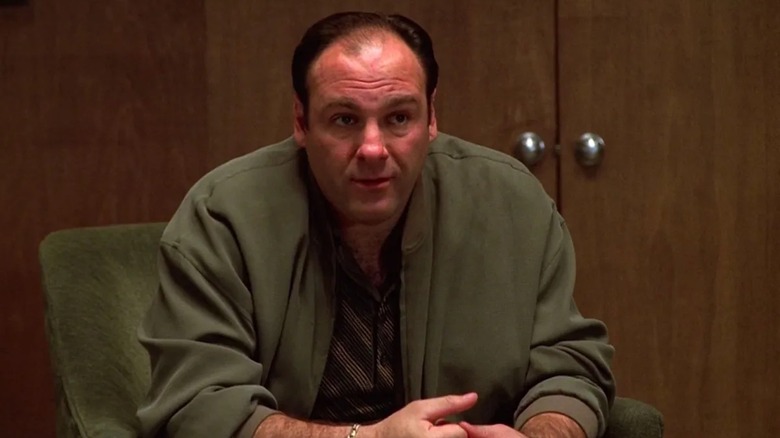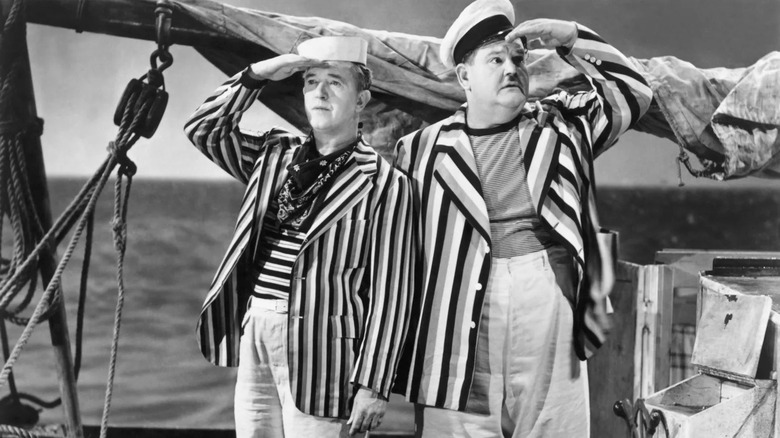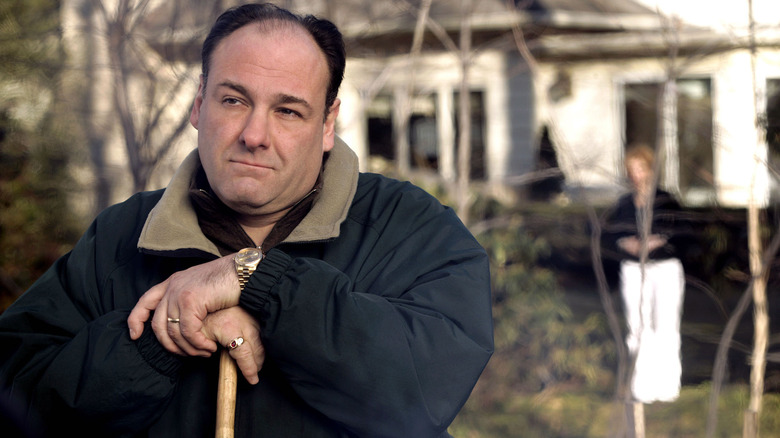The Surreal Laurel And Hardy Comedy That (Apparently) Inspired The Sopranos
Sometimes great movies and TV shows have the most unlikely sources of inspiration. Nick Park and Aardman Animations' masterpiece "Chicken Run" was based on John Sturges' classic POW adventure "The Great Escape," while "Logan" director James Mangold pitched the film as "'Little Miss Sunshine" with Wolverine and Charles Xavier (via Empire). When it came time to screen episodes of his iconic and wildly influential HBO series "The Sopranos" at the Museum of Modern Art, creator David Chase paired it with an unlikely inspiration: the 1940 Laurel and Hardy classic "Saps at Sea."
You might think that "Goodfellas" or "Public Enemy" or "Carlito's Way" might have been a more appropriate pick, but Chase has a good explanation for his choice (via Vanity Fair):
"I really like comedy. There's always a choice, when you're writing: you can either go for the joke or you can go for the story, the important stuff. And a lot of times, we'll go for the joke. 'The Sopranos' is filled with really retrograde humor. Bathroom humor, falls, stupid puns, bad jokes—infantile, adolescent stuff, but it makes me laugh."
Perhaps Chase is overstating the comedic aspect, but "The Sopranos" is often far more humorous than many touchstones of the gangster genre. Indeed, I struggled with the show at first because I was confused by the broadness of the tone and some of the performances. While Stan and Ollie are usually more of a danger to themselves than others, "Saps at Sea" does have some parallels with "The Sopranos" and its frazzled protagonist, with stress and a dangerous criminal forming key parts of the story.
So, what happens in Saps at Sea?
Stan and Ollie work together as testers in a horn factory, a very noisy job that often sends its employees around the bend. After Ollie loses his s*** one day, his doctor diagnoses him with "Hornomania" and recommends a nice sailing trip on the ocean to relax, along with plenty of fresh goat's milk.
The problem with that plan is that Ollie is afraid of sailing, so they rent a boat and keep it tied to the dock instead. Unfortunately, the pesky goat chews through the mooring rope and they find themselves adrift at sea with a very unwelcome stowaway, an escaped convict called Nick. Holding the boys at gunpoint with his firearm, nicknamed Nick Jr., the criminal demands breakfast. Can the two halfwits put their heads together and come up with a master plan to outwit the killer?
Laurel and Hardy were one of the few silent-era acts to successfully make the transition to talkies, with their distinct vocal styles and goofy wordplay adding another dimension to their well-established slapstick routine. While their feature-length films lack the anarchy of their earlier shorts and sometimes feel a little padded out, the cumulative effect of the gags and pratfalls still pile up to hilarious effect. While it isn't as highly regarded as "Sons of the Desert" or "Way Out West," "Saps at Sea" is still great fun, adding a rare element of peril with the menacing Nick onboard.
Tony Soprano: The Oliver Hardy of screen gangsters?
David Chase has often cited "Saps at Sea" as one of his favorite childhood films (via NPR):
"When I was a kid, I used to watch Laurel and Hardy with my cousins all the time. I still think they're extremely funny and so surreal. ["Saps at Sea"'] is a really good comedy, but also the gangster is kind of scary... [I also] cribbed something from it for 'The Sopranos' one time."
The reference Chase is talking about comes in an episode when Tony Soprano's uncle Junior asks his mistress to "Go check on Junior's Junior," although unlike Nick he isn't referring to his gun.
Tony Soprano, played so brilliantly by James Gandolfini, was based on Vincent "Vinny Ocean" Palermo, the real-life former boss of a New Jersey crime family who turned government witness in 1999. Yet if we think about Soprano in comparison with Oliver Hardy, the similarities are there. Both are heavy-set men prone to frustrated outbursts and, although Soprano is a violent killer, he is often exasperated by the actions of those around him. In "Saps at Sea," Ollie suffers from stress and is prescribed relaxation, while Tony struggles with anxiety and depression and requires therapy. Watching Tony's reactions, sometimes all we're missing is Ollie's "see what I have to deal with?" glances at the camera.
So there you have it: Tony Soprano is the Oliver Hardy of screen mobsters.


